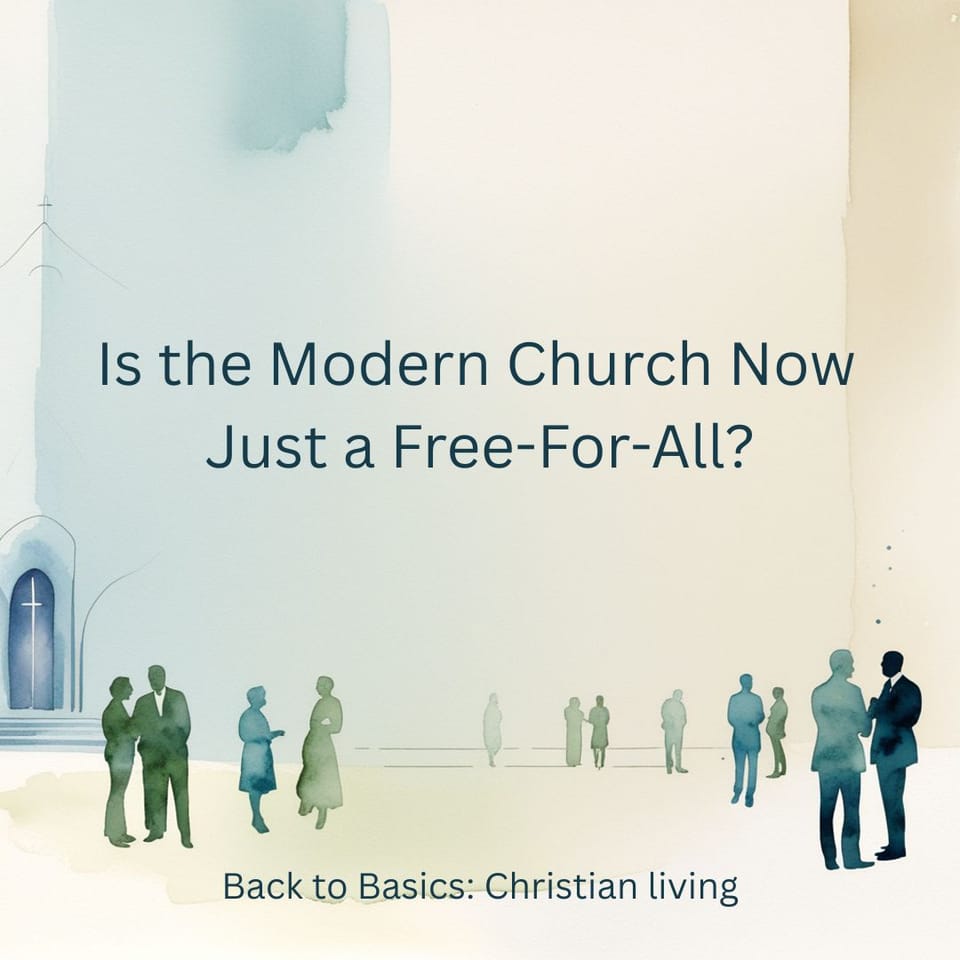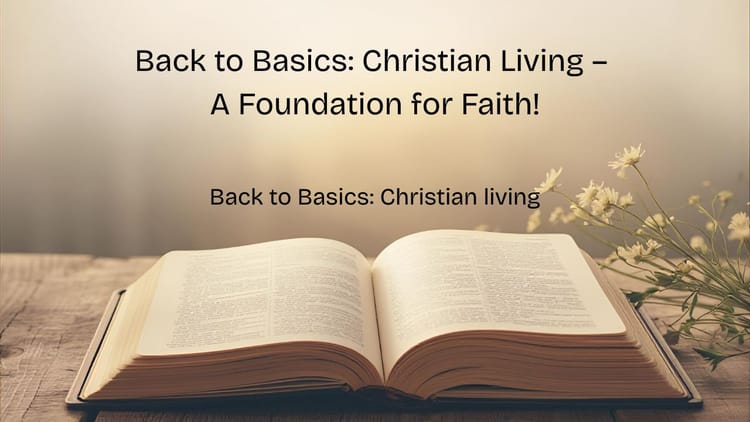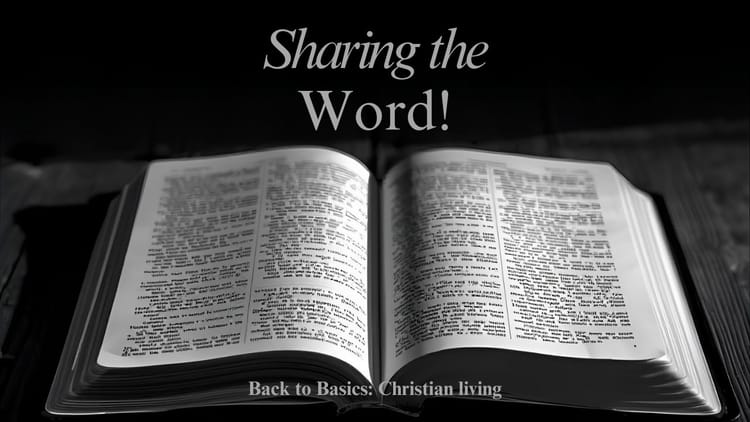Is the Modern Church Now Just a Free-For-All?

Confronting Compromise in the Contemporary Church
In many churches today, feelings are treated as final authority and order gives way to personal preference. This short study asks a hard question and points us back to Scripture as our plumb line.
If we love Jesus and his people, we must love the truth he has given us and let it shape our worship, our love, and our daily obedience.
The Absence of Biblical Truth in Today's Congregations!
In an age of relativism and personal preference, a disturbing trend has emerged within many of our churches. What was once a bastion of unwavering biblical truth has, in many instances, become a spiritual playground where doctrine is determined by feelings rather than Scripture. This transformation raises a critical question: Has the modern church become a free-for-all regarding the absence of truth being taught?
The Apostle Paul foresaw this very situation when he warned Timothy, "For the time will come when they will not endure sound doctrine; but after their own lusts shall they heap to themselves teachers, having itching ears; And they shall turn away their ears from the truth, and shall be turned unto fables" (2 Timothy 4:3-4 KJV). This prophecy seems eerily fulfilled in many of today's congregations.
When we examine the state of the modern church, several concerning patterns emerge that suggest a departure from biblical fidelity:
The Elevation of Experience Over Scripture
Many churches now prioritise emotional experiences over sound biblical teaching. While genuine spiritual experiences are valuable, they must always align with God's Word. Jesus himself declared, "Ye shall know the truth, and the truth shall make you free" (John 8:32 KJV). Freedom doesn't come through unexamined spiritual experiences but through truth firmly rooted in Scripture.
When experiences supersede biblical authority, we create environments where "every man doeth that which is right in his own eyes" (Judges 21:25 KJV). The result is doctrinal chaos and spiritual confusion rather than the ordered worship Paul advocated when he wrote, "Let all things be done decently and in order" (1 Corinthians 14:40 KJV).
The Distortion of Love
Perhaps no concept has been more misunderstood and misapplied in the modern church than love. Yes, "God is love" (1 John 4:8 KJV), but this truth doesn't exist in isolation from God's other attributes. True biblical love never contradicts God's holiness, righteousness, or justice.
Scripture teaches that authentic love "rejoiceth not in iniquity, but rejoiceth in the truth" (1 Corinthians 13:6 KJV). When churches separate love from truth—presenting a God who accepts all beliefs and behaviours without distinction—they create a false gospel.
The modern notion that love means unconditional affirmation contradicts the biblical understanding that genuine love sometimes requires correction: "For whom the Lord loveth he chasteneth" (Hebrews 12:6 KJV). A church that never corrects is not showing more love; it's showing less biblical faithfulness.
The Abandonment of Order
The free-for-all approach is particularly evident in how many churches handle worship. Paul provided clear instructions about spiritual gifts like speaking in tongues: "If any man speak in an unknown tongue, let it be by two, or at the most by three, and that by course; and let one interpret. But if there be no interpreter, let him keep silence in the church" (1 Corinthians 14:27-28 KJV).
These guidelines weren't meant to restrict the Holy Spirit but to ensure that "all things be done unto edifying" (1 Corinthians 14:26 KJV). When churches ignore these principles in the name of spiritual freedom, they aren't being more Spirit-led; they're being less biblically obedient.
The False Dichotomy of Law & Grace
Many have mistakenly concluded that being under the New Covenant means freedom from biblical authority. This misunderstands the nature of the New Covenant, which Jeremiah described as God putting His law "in their inward parts, and write it in their hearts" (Jeremiah 31:33 KJV).
The New Covenant doesn't abolish God's standards; it empowers believers to fulfil them through the Holy Spirit. As Paul explained, "For the law of the Spirit of life in Christ Jesus hath made me free from the law of sin and death" (Romans 8:2 KJV). Our freedom in Christ is freedom to obey from a transformed heart, not freedom to ignore biblical truth.
The Road to Recovery
How can churches recover from this truth deficit? Several biblical principles offer guidance:
- Return to the full counsel of Scripture. Paul reminds us that "All scripture is given by inspiration of God, and is profitable for doctrine, for reproof, for correction, for instruction in righteousness" (2 Timothy 3:16 KJV). Churches must teach the whole Bible, not just comfortable passages.
- Restore the balance of grace and truth. Jesus was "full of grace and truth" (John 1:14 KJV), and our churches should reflect both qualities. Truth without grace becomes legalism; grace without truth becomes licence.
- Reclaim loving correction. Scripture instructs us: "Brethren, if a man be overtaken in a fault, ye which are spiritual, restore such an one in the spirit of meekness" (Galatians 6:1 KJV). Biblical churches practise restoration, not mere affirmation.
- Re-establish biblical order. Paul's instruction that "all things be done unto edifying" (1 Corinthians 14:26 KJV) should guide our worship practices. Freedom in Christ operates within the boundaries of biblical authority.
- Revive biblical discernment. We are commanded to "Prove all things; hold fast that which is good" (1 Thessalonians 5:21 KJV). Every teaching and practice must be evaluated against Scripture's standard.
A Call to Courageous Faithfulness
The modern church stands at a crossroads. Will we continue drifting toward a faith defined by personal preference, or will we return to the solid foundation of biblical truth?
Our calling is clear: "speak the truth in love" (Ephesians 4:15 KJV). We cannot abandon either element. Truth without love becomes harsh and unapproachable; love without truth becomes meaningless sentimentality.
The promise remains that "where the Spirit of the Lord is, there is liberty" (2 Corinthians 3:17 KJV). But this liberty is not freedom to ignore God's Word—it is freedom to embrace it wholeheartedly from a position of grace rather than fear.
As we navigate these challenging waters, may we be found faithful to the unchanging truth of God's Word. For as Jesus promised, "Heaven and earth shall pass away, but my words shall not pass away" (Matthew 24:35 KJV).
The modern church need not be a free-for-all. With courage, conviction, and compassion, we can reclaim our calling to be "the pillar and ground of the truth" (1 Timothy 3:15 KJV) in a world desperately in need of God's unchanging wisdom…
Key Takeaways:
- Scripture, not feelings, is our final authority for faith and practice.
- Love and truth belong together; real love rejoices in the truth.
- Worship should be orderly and edifying, not chaotic.
- Grace in the New Covenant empowers obedience from the heart.
- Churches thrive when they teach the whole counsel of God and practice discernment.





